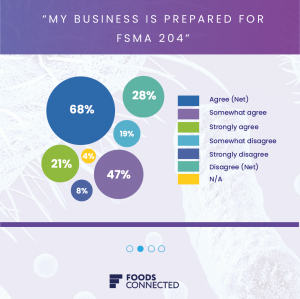New research reveals the US Food Industry's readiness for FSMA 204 and top barriers to traceability
New research from Foods Connected shows how ready firms are & reveals the ‘top barriers to traceability’ in the food industry, according to US Business Leaders
CHICAGO, IL, UNITED STATES, May 15, 2024 /EINPresswire.com/ -- Foods Connected2 US HQ, Chicago: The Food Industry is on countdown as governments worldwide transition to full food traceability.
Over a quarter (28%) of US Food Businesses still not ready for FSMA, shows research from Foods Connected.
In the US it is traceability legislation FSMA 204 that is driving digital transformation, bringing with it one of the biggest shift changes in food since the industrial revolution, says the global supply chain management team. But there’s still a long way to go for companies working hard to create full transparency to adhere to the new stringent rules.
250 food firm bosses of medium- and large-scale firms (250+ employees) in the US were asked what the biggest challenges were in enabling full transparency within their supply chains right now - and will they be ready when the new regulations come into force.
This has resulted in 72% of large-scale food businesses admitting they are still encountering challenges in tracking where their produce and raw materials are coming from - and 28% overall saying they are not ready for FSMA 204 specifically. This could be attributed to the results showing that while business leaders feel there is enough funding from the government available to support traceability, a lack of awareness and education around how to access it is hindering progress in the sector.
These are the top 8 challenges US Food Industry Bosses currently face around Traceability:
1. Insufficient education around the funding opportunities available for businesses wanting to digitize their supply chain tracking (39%)
2. Lack of understanding around what traceability means and how it can benefit businesses (36%)
3. The industry has been slow to invest in new tracking technologies (35%)
4. Businesses are collecting the right data, but not analyzing it (32%)
5. External pressures, (Pandemic, War) on the Supply Chain (31%)
6. Businesses needing to upskill staff (29%)
7. Data silos are preventing the creation of a connected transparent supply chain (28%)
8. Not enough visibility of new industry regulations (20%)
Dr Stephanie Brooks, Head of Business – Traceability Innovation at Foods Connected says:
“70% of US business leaders feel there is enough funding available from the government to support firms in their traceability journey. However, a large number of respondents commented that there was still a job to be done in terms of education around this funding and how to access it. This funding has been key in increasing understanding around traceability and how it can benefit businesses. The pot is there, we want businesses to use it.
“At a very basic level, some businesses still don’t really understand that they need visibility of their supply chains and how supply chain visibility is at the core of traceability. What’s needed is an education and awareness piece. Education around what direction traceability is going and awareness around what funding avenues are available to try and meet some of these challenges.”
This education deficit has meant that there is a general lack of understanding around what traceability means and how it can benefit businesses, with 20% of leaders commenting that there is still a job to be done around educating on the upcoming legislation. With over a quarter of businesses are not ready for FSMA 204, rising to 40% for business with a $500m+ revenue, the lack of understanding around the importance of traceability has potentially been impacted by a reticence to invest into new supply tracking technologies - an issue for 35% of businesses.
Dr Stephanie Brooks says,
“36% of US Businesses feel that there is a lack of understanding around the importance of supply chain traceability at this integral time. It’s massively encouraging that the remainder of businesses feel up to speed, but the fact that a lack of awareness around funding and traceability in general is concerning and we need to fill in any gaps for US retailers and suppliers in light of the upcoming regulations. 35% of businesses have not invested in new technologies at all when it comes to data tracking - still depending on paper trails for example - and this is going to cause issues as to when they are expected to perform spot checks for FSMA 204 in 2026.”
The research also shows that data silos are preventing the creation of a connected transparent supply chain in 28% of businesses.
Dr Fiona Roberts, Head of Business - Animal Welfare, Compliance & Environment in Implementation & Customer Success at Foods Connected says:
“While it is encouraging to hear that over a quarter of US businesses (28%) feel they are able to store data across all aspects of the business - across multiple sites and teams - data silos are cited as a major issue with exactly the same amount of leaders surveyed saying that they are still preventing a truly connected transparent supply chain. However evidence suggests that these businesses are struggling to analyze this data effectively - for example there are still 24% of businesses struggling to quantify Scope 3 emissions. Investing in new technology will also benefit Food Safety in the long run too. 74% of businesses surveyed feel that not enough is being done to safeguard consumers against allergen issues - this is shockingly high.”
Download Traceability: a global snapshot of the food industry's digital evolution HERE [download report]1
For more information and interview time with Dr Stephanie Brooks and Dr Fiona Roberts please contact Jo Baird
Joanne Baird
Foods Connected
+44 7814 267444
joanne@joannebaird.com
1 https://bit.ly/4ajO6rY
2 http://www.foodsconnected.com

